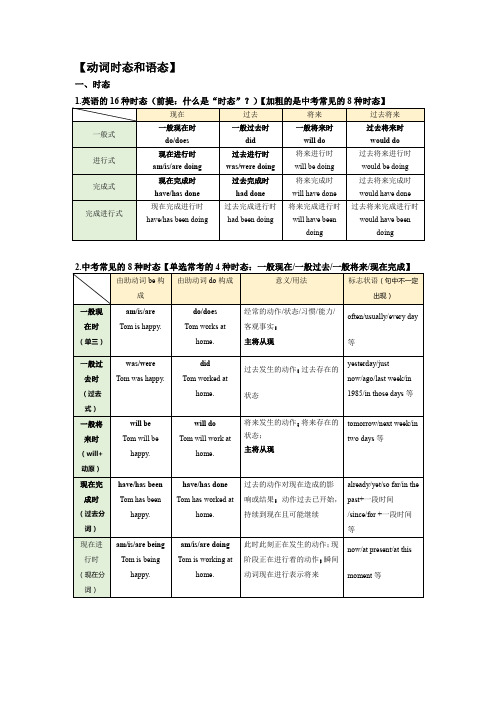人教版初中英语时态全集
人教版七年级英语下册一般现在时态、现在进行时态、一般过去时态三种时态 综合讲解 (共20张PPT)

buy can -
bought
went
had knew learnt made
could
sit takethinkwill tell -
come- came do eat fall find did ate fell
make meet read run say -
would
told
met
read ran said
③以“辅音+y “结尾变y 为i再加-es.
①直接加-ed. 过去式的构成: ②以e结尾只加d. ③重读辅元辅,双写尾字母再加-ed. ④以“辅音+y”结尾变y 为i 再加-ed.
现在分词 have - having look - looking begin- beginning useusing
先(一般疑问句) 再(否定句)
句 型 变 化 操 练
He isn’t a teacher. 2. Kangkang comes from China. Does Kangkang come from China? Kangkang doesn’t come from China.
3.
I usually take the bus to work. Do you usually take the bus to work?
last night
now every day
一般现在时
Look!
yesterday often Listen! two years ago
一般过去时
always
in 1897 three times a week
现在进行时
判断时态形式:
1. 2. 3. 4. 5. 6. 7. He always likes playing the piano.(
2023-2024学年人教版七年级英语上册期末复习四种时态总结

2023-2024学年人教版七年级英语上册期末四种时态总复习1.疑问词+一般疑问句(去掉提问部分)2.若提问主语,选定疑问词替换主语即可3.疑问词作主语,谓语动词一般用三单4.若连同谓语动词一起提问,疑问词用what ,并借用实意动词do 替代谓语动词部分一般现在时 现在进行时(be doing)一般过去时 一般将来时(be going to do/ will do)肯定句 She is a teacher.She works here. She is working here.She was a teacher.She worked here. I ’m going to practice English every day.Kids will study at home on computers.否定句1.be 动词后直接+not2. 动词前+don ’t/doesn ’t 1.be 动词后直接+not1.be 动词后直接+not2.动词前+didn ’t1.be 动词后直接+not2.will 后直接+not (will not/won ’t ) 一般疑问句 1.be 动词直接提前 2.借助助动词do/does 提前 1.be 动词直接提前 1.be 动词直接提前2.借助助动词did 提前1.be 动词直接提前2.will 直接提前特殊疑问句1.疑问词+一般疑问句(去掉提问部分)2.若提问主语,选定疑问词替换主语即可1.疑问词+一般疑问句(去掉提问部分)2.若提问主语,选定疑问词替换主语即可 1.疑问词+一般疑问句(去掉提问部分) 2.若提问主语,选定疑问词替换主语即可 1.疑问词+一般疑问句(去掉提问部分)2.若提问主语,选定疑问词替换主语即可时间状语频度副词always 、usually 、three times a daynow 、listen 、look 、these daysyesterday 、two days ago 、in 1999、this morning 、just now 、last yearin +一段时间、tomorrow 、the coming year 、next September 、if 条件状语从句/when 时间状语从句动词三单1.一般:-s2. s/x/ch/sh-es (watches/finishes)3. 辅+y :变y 为i-es(tries/worries )现在分词1. 一般:-ing2.去e-ing (using 、making)3.辅元辅,双写-ing(swimming/running)动词过去式 1.一般:-ed 2.e 结尾加-d(lived) 3.辅+y :变y 为i- ed(worry-worried ) 4.辅元辅:双写-ed (stopped 、planned)There be 句型的将来时 1.There is/ going to be … 2.There will be …计划打算:be going to 主将从现:will注意:动词原形四种情形:1.情态动词(can/may/might/have to/must/will/would/should/shall)+动词原形2.祈使句中,用动词原形3.助动词do/don’t/does/doesn’t/did/didn’t 后,用动词原形4.使役动词let/make/have sb. do注意:v-ing的三种情况1.现在进行时be doing2.介词+v-ing3.enjoy/miss/mind/finish/have fun/practice/keep/suggest/avoid/can’t help/consider/feel like/give up doing注意:主将从现主将从现主句一般将来时从句一般现在时will +动原if后引导的是从句动原/三单If it rains tomorrow, we will not go to the zoo.从句(现)主句(将)If he doesn’t come, I will phone/call him.从句(现)主句(将)Eg:肯定句: I’m going to practice basketball every day.否定句:I’m not going to practice basketball every day.一般疑问句:Are you going to practice basketball every day.特殊疑问句:1. 若提问主语,选定疑问词替换掉主语即可Who is going to practice basketball every day? (对I提问)2. 疑问词+一般疑问句(去掉提问部分)What are you going to practice every day? (对basketball提问)How often are you going to practice basketball? (对every day提问)What are you going to do every day? (对practice basketball提问)肯定句:Tom is going to move to Shanghai next year. (习题)否定句:__________________________________________.一般疑问句: ____________________________________________. 特殊疑问句:1. _______________________________________________________.2. _______________________________________________________. 3_______________________________________________________.4.______________________________Eg:肯定句: Robots will think like humans in the future.否定句:Robots won’t think like humans in the future.一般疑问句:Will robots think like humans in the future?.特殊疑问句:1. 若提问主语,选定疑问词替换掉主语即可what will think like humans in the future? (对Robots提问)2. 疑问词+一般疑问句(去掉提问部分)What will robots think like in the future? (对humans提问)When will robots think like humans? (对in the future提问)What will robots do in the future? (对think like humans提问)肯定句: Cities will be more crowded and polluted in 100 years.(习题) 否定句:__________________________________________.一般疑问句: ____________________________________________. 特殊疑问句:1. _______________________________________________________.2. _______________________________________________________. 3_______________________________________________________.Eg:肯定句: Tom visited his grandpa by train last week.否定句:Tom didn’t visit his grandpa by train last week.一般疑问句:Did Tom visit his grandpa by train last week.特殊疑问句:1. 若提问主语,选定疑问词替换掉主语即可Who visited his grandpa by train last week? (对Tom提问)2. 疑问词+一般疑问句(去掉提问部分)Who did Tom visit by train last week? (对his grandpa提问)when did Tom visit his grandpa by train ? (对last week提问)How did Tom visit his grandpa last week? (对by train提问)What did Tom do by train last week? (对visited his grandpa提问)肯定句:Tom went to Beijing with his friends yesterday? (习题)否定句:__________________________________________.一般疑问句: ____________________________________________. 特殊疑问句:1. _______________________________________________________.2. _______________________________________________________. 3_______________________________________________________.4.________________________________________________________.。
人教版初中英语中考时态复习(全国通用)英语八种时态讲解及练习

10. I will go there when I _____(have, will have, has) time tomorrow. 11. He won’t come to the party unless he _____(be, will be, am, is, are) invited. 12. I’ll wait here until my mother ____(come, comes, will come) back. 13. Please return the book to the library as soon as you ______(finish, finishes, will finish) reading it. 14. Once you _____(see, sees, will see) him, you will never forget him.
1.I ____(write, am writing, is writing, are writing) a letter now. 2.Look, it _____(begin, is beginning, am beginning, are beginning) to rain. 3.They ____(study, is studying, am studying, are studying) medicine at the Medical Institute of Chengde these days. 24.He _____(teach, am teaching, is teaching, are teaching) an English lesson at this time.
现在进行时
作谓语的动词用来表示动作(情况) 发生时间的各种形式称为时态。
完整版人教版初中英语语法完整总结

完整版人教版初中英语语法完整总结人教版初中英语语法完整总结如下:时态:动词的时态分为一般现在时、一般过去时、一般将来时、现在进行时、过去进行时、现在完成时、过去完成时。
一般现在时(Simple Present Tense):表示经常性活动、习惯或客观事实。
一般过去时(Simple Past Tense):表示过去发生的动作或状态。
一般将来时(Simple Future Tense):表示将来发生的动作或状态。
现在进行时(Present Continuous Tense):表示现在正在进行的动作。
过去进行时(Past Continuous Tense):表示过去某个时间点正在进行的动作。
现在完成时(Present Perfect Tense):表示过去发生的动作对现在造成的影响或一直持续到现在的动作。
过去完成时(Past Perfect Tense):表示过去某个时间点或动作之前已经发生过的动作或状态。
语态:英语中的语态分为主动语态和被动语态。
主动语态(Active Voice):主语为动作的执行者。
被动语态(Passive Voice):主语是动作的承受者。
名词:名词主要负责表示事物的名称和概念。
可数名词(Countable Nouns):表示可以计数的名词,可有单数和复数形式。
不可数名词(Uncountable Nouns):表示不可数的名词,只有单数形式。
复数名词(Plural Nouns):表示复数的名词,可通过在名词后加-s或-es形成。
冠词:冠词主要用于限定名词。
不定冠词(Indefinite Article):a/an,表示泛指。
定冠词(Definite Article):the,表示特指。
形容词:形容词用于修饰名词,表示事物的性质、特征或状态。
比较级与最高级:形容词有比较级和最高级形式,用于比较两个或多个事物的程度。
比较级(Comparative):表示两者之间的比较。
最高级(Superlative):表示三者或以上之间的比较。
初中人教英语时态

初中人教英语时态一、现在一般时现在一般时表示现在时刻发生的动作或存在的状态。
其基本结构是“主语+谓语+宾语”,例如:I eat an apple every day.二、过去一般时过去一般时表示过去某个时间发生的动作或存在的状态。
其基本结构是“主语+谓语+宾语”,例如:She studied English last year.三、将来一般时将来一般时表示将来某个时间发生的动作或存在的状态。
其基本结构是“主语+will+谓语+宾语”,例如:He will visit his grandparents next week.四、现在进行时现在进行时表示现在正在进行的动作。
其基本结构是“主语+be 动词+谓语动词-ing”,例如:They are playing basketball now.五、过去进行时过去进行时表示过去某个时间正在进行的动作。
其基本结构是“主语+was/were+谓语动词-ing”,例如:They were having dinner at 6 o’clock yesterday.六、将来进行时将来进行时表示将来某个时间正在进行的动作。
其基本结构是“主语+will be+谓语动词-ing”,例如:They will be studying in the library next week.七、现在完成时现在完成时表示过去发生的动作或存在的状态,对现在造成的影响或结果。
其基本结构是“主语+have/has+谓语动词过去分词”,例如:I have finished my homework.八、过去完成时过去完成时表示过去的某个时间点之前已经完成的动作。
其基本结构是“主语+had+谓语动词过去分词”,例如:She had written a letter before she went to bed.。
英语人教版九年级全册初中常见时态总结 思维导图式

初中英语时态复习巩固“三个一般,两个进行,两个完成”一般现在时现在进行时现在完成时一般过去时一般将来时过去进行时过去完成时一、一般现在时(概念,句式结构,常用时间状语;用法)1、概念,句式结构,常用时间状语。
(1)概念:一般现在是主要表示经常性或习惯性的动作或存在的状态,也可表示现在的情况或状态以及永恒的真理。
(2)句式结构:Be(is , am , are) +表语,如:She is a beautiful girl.There be (is , are )句型,如:There is a schoolbag on the desk.实义动词作谓语, 谓语用动词原形,但主语是第三人称单数时,谓语要用相应的单数第三人称形式如:They usually go to school on foot.She likes chocolate.(3)常用时间状语:always,usually,often,everyday等。
2.一般现在时的用法(1)表示经常性或习惯性的动作或存在的状态,常与表频度的时间状语连用。
如:My mother often does housework. 我妈妈经常做家务。
(2)描述现在的情况,状态等。
如:He speaks Russian very well.他讲俄语讲得很好。
(3)描述客观真理、客观存在或科学事实等。
如:Light travels faster than sound.光比声音传播速度快。
(4)注:在含时间状语从句或条件状语从句的复合句中,若主句用一般将来时,则从句用一般现在时表示将来,即“主将从现”如:I will ring you if he comes back tomorrow.如果他明天回来,我就给你打电话。
例: I will send you an e-mail as soon as I _________in Canada.A. arrive B arrived C am arriving D will arrive(5) 在以here , there开头的句子中常用一般现在时代替进行时。
人教版英语九年级全册动词时态和语态知识点及相应习题

【动词时态和语态】一、时态3.主将从现(1)条件状语从句由if(如果)、as long as(只要)、unless(除非)引导,主句为一般将来时或表述将来含义,从句用一般现在时。
例如:She had better travel with a local tour guide if she wants to know more about the culture.(2)时间状语从句由when(当……时候)、as soon as(一……就……)、until(直到)等引导,主句为一般将来时或表述将来含义,从句用一般现在时。
例如:I’ll discuss this matter with you when we meet next time. / We won’t leave until Mary arrives.考点5 现在完成时have/has+(not+)过去分词(1)表示过去的动作对现在产生的结果和影响现在完成时表示过去某个时间曾经做过的、发生过的事情,对目前的某种影响,这时一般不用时间状语;也可以表示到目前为止没有发生或经历的事情。
The tickets have sold out.(票已售空。
)I have tried Italian food. It’s delicious!(我已经尝过意大利美食了。
美味啊!)Simon has seen the concert. He doesn’t want to see it again.(西蒙已经看过这场演唱会,不想再看了。
)I have never visited San Francisco in the U.S.A.(我从没去过美国的旧金山。
)(说明过去没有去过,现在仍没去过)I have just heard the news that our school will set up a press club.(我刚听到消息说我们学校要成立一个记者俱乐部。
英语人教版九年级全册初中时态

Thank you!
②be about to do 结构表示客观、马上就要发生的事,一般不与具体的时间 状语连用。
③be going to 结构表示必然或很可能发生的事情;be to do结构表示按职责、 义务和要求必须去做或即将发生的动作。
4.现在进行时
(1)概念:表示现在或现阶段正在发生或持续的动作。
(2)构成形式:am/is/are+动词的-ing 形式。 (3)与现在进行时连用的时间状语及提示语有:now,these days, right now, at present, at this moment, Look!, Listen!等。
(9)there be结构的一般将来时为there will be/there is going to be。
(10)will/shall, be about to do 与 be going to 的区别。
①一般将来时的基本结构为“will/shall+动词原形”,表示一个将要发生的动 作或状态。
1.一般现在时
概念:(1)表示经常性、习惯性的动作;
(2)表示现在的情况或状态;
(3)表示客观事实和普遍真理
构成形式:am/is/are或实义动词的原形(主语 是第三人称单数时,动词要用第三人称单数 形式)。
时间状语:always,often,usually, sometimes,once a week,every day等。
①表示有礼貌地询问对方是否愿意或表示客气的邀请或命令时。
②表示意愿时。
③表单纯性的将来,与人的主观愿望和判断无关时。 The sun will set at 7:30 this afternoon. 太阳会在下午7:30落下。
(7)当主句为一般将来时态时,在if,as soon as,until, when等引导的 状语从句中用一般现在时代替一般将来时。 (8)位移词的进行时表将来。
- 1、下载文档前请自行甄别文档内容的完整性,平台不提供额外的编辑、内容补充、找答案等附加服务。
- 2、"仅部分预览"的文档,不可在线预览部分如存在完整性等问题,可反馈申请退款(可完整预览的文档不适用该条件!)。
- 3、如文档侵犯您的权益,请联系客服反馈,我们会尽快为您处理(人工客服工作时间:9:00-18:30)。
初中英语八大时态一一般现在时1构成:构成:do/does---------V(原形)或V+s/es2 重点用法:a 客观真理。
Birds fly.b 现阶段习惯性动作。
We have four classes everyday.c 表将来1)按时间表进行的,飞机、火车、巴士的出发The train for Guangzhou leaves at 7:00.2) 时间状语从句(till, until, when, as soon as等引导),条件状语从句(unless, if引导)中表将来。
(主从) If it rains tomorrow, we will have to stay at home.3 标志词:频率副词(often, everyday, on Sundays等)二一般过去时1 构成:动词过去式did----------V-ed(不规则动词表的第二列)2 重点用法:过去的事情He always went to work by bus last year.3 标志词:I worked here ten years ago.以及表示过去的时间( year, yesterday…) I got sick yesterday.三一般将来时1 构成will/shall do 或am/is/are going to do ----------will+ V原形2 重点用法:将来的事情I will tell him about it.3 标志词:in+ 一段时间I will be back in an hour.以及表示将来的时间(week, tomorrow…)四过去将来时1 构成would do 或was/were going to do---------would+V(原形)2 重点用法从过去某一时刻看将来要发生的事情。
特别是宾语从句红,主句said, wanted to know动词的过去式时,宾语从句中,表示过去的将来。
Linda said that she _________visit her uncle the next Saturday.He wanted to know if they would go there that afternoon五现在进行时1 构成is/am/are+Ving2 重点用法:a说话时Look, the child is playing in the street.b现阶段正在进行的动作。
He is building a model these days.c 频繁发生或反复进行的动作。
与always等频率副词连用,表不满,赞扬或讨厌。
You are always talking in the class.d come, go, leave, arrive等过渡性动词用现在进行时表将来。
My brother is leaving for New York next week.3 标志词:now, these days.六过去进行时1 构成was/were doing--------was/were+ V-ing2 重点用法:a 由when 引导的时间状语从句,表示过去某一时刻,A动作发生时,B动作正在进行。
则A动作用一般过去时,B动作用过去进行时。
The twins were sweeping the floor when the teacher came in.b 由While引导从句,两动作都用过去进行时。
Father was watching TV, while Mother was cooking.c 看到有表示过去的时间,并且是具体到时间点。
(at four yesterday)He was mending his bike at ten yesterday.3 标志词:表示过去的具体到时间点的时间(five o’clock the day before yesterday.), that time七现在完成时1 构成have/has done---------have/has+V-ed2 重点用法:a 过去的动作,但对现在有影响。
Would you like to see a film with me?No, I have seen it.b 从过去开始延续到现在的动作或者状态I have been studying English for 6 yeats.3 标志词:a already, ever just, yet, since+具体时间或者时间, for+一段时间B by+具体的时间4 注意事项:a 短暂性动词不能与since+具体时间或者时间或for+一段时间,I have been away from here for three days. (right)I have left here for since (wrong)b have been to表示去过某点,已经回来了。
have gone to 去了某点,但还没回来。
八过去完成时1 构成had done------------had+V-ed2 重点用法:a 过去的过去!(一定要有第一个过去,才有第二个过去,才用到过去完成时)3 标志词:by+过去的时间或by the time+过去的事情或by the end of +过去的时间,即与by有关的时间状语。
初中英语8种时态分类练习1.一般过去2.一般现在与现在进行4一般将来5过去进行6现在完成7过去完成8一般过去时专练( )1. The mother asked the boy _______ down the ladder, but he went on _______ instead.A. come; climbingB. to come; to climbC. to come; climbingD. coming; climbing( )2. The teacher asked the students to close the windows _______ the wind from _______ the papers away.A. to stop; blowingB. stopping; blowingC. to stop; blowD. stopped; blow( )3. The sick man stayed in bed, _______ very terrible.A. feltB. feelingC. is feelingD. was feeling( )4. Yesterday I heard a story _______ by my friend.A. toldB. tellingC. to tellD. tell( )5. The boy was made _______ there for an hour by his father.A. standingB. standC. to standD. stands( )6. I saw him _______ into the small store.A. wentB. goingC. to goD. has gone( )7. He raised his voice to make everybody in the room ______ him clearly.A. hearB. to hearC. hearingD. heard( )8. Our geography teacher told us yesterday that the earth _______ around the sun.A. was movingB. movedC. has movedD. moves( )9. Oh, it’s you. I’m sorry I _______ know you _______ here.A. don’t; areB. didn’t; areC. didn’t; wereD. don’t; were ( )10. Mr LuXun died in 1936. He _______ a lot of famous novels.A. wroteB. was writingC. has writtenD. would write ( )11. --- How was your weekend on the farm?--- Great! We _______ with the farmers.A. enjoy ourselvesB. went fishingC. will workD. make friends( )12. --- What did Mr Jones do before he moved here?--- He _______ a city bus for over twenty-five years.A. is drivingB. droveC. has drivenD. drives( )13. Jane _______ a new dress every month when she was in Shanghai.A. buysB. is buyingC. boughtD. will buy ( )14. --- Liu Mei can’t come tonight.--- Why? But she _______ me she would come.A. tellsB. toldC. is toldD. had told( )15. He turned off the light and then _______.A. leavesB. has leftC. will leaveD. left一般过去时专练1-5 CABAC 6-10 BADCA 11-15 BBCBD一般现在时与现在进行时专练( ) 1. Father usually ______ his newspaper after dinner.A. readB. readsC. readingD. is reading( ) 2. The Blacks often ______ to the cinema on Saturday evenings.A. goB. goesC. is goingD. are going( ) 3.Look! The boy ______ with his mother in the pool.A. is swimmingB. is swimmingC. are swimmingD. are swiming( ) 4.--- What is Tom doing in the classroom? --- He ______ something on the blackboard.A. drawsB. drawC. is drawingD. are drawing.( ) 5.Old Tom usually ______ up at six and ______ sports in the garden.A. gets, dosB. gets, doesC. get, doesD. gets, do( ) 6. It’s ten o’clock and Jack ______ still(仍然) ______ his homework.A. is, doB. is, doingC. are, doD. are, doing( ) 7. The waiters ______ to work at five every morning.A. startB. startsC. startingD. are starting( ) 8.I ______ a letter, so I can’t go out with you.A. is writingB. am writingC. am writeingD. am writting( )9.A hundred days _____ quite a long time.A. isB. areC. haveD. has( )10. --______ late for the meeting next time. –Sorry, I won’t.A. Don’tB. Don’t beC. Won’t beD. Be not( )11. My mother _____ noodles, but my father ______.A. likes, doesn’tB. don’t like, doC. likes, didn’tD. didn’t like, do ( )12. The picture ______ nice.A. looksB. is lookedC. lookD. is looking( )13. The students will go to the Summer Palace if it ______ tomorrow.A. don’t rainB. doesn’t rainC. won’t rainD. isn’t rain( )14. We are always ready _______ others.A. to helpingB. to helpC. helpD. helping( )15. I often hear her ______ about the boy.A. talkingB. talkC. to talkD. talked( )16. He’s already a little weak in Chinese, ______ he ?A. isB. isn’tC. hasD. hasn’t( )17.Potatoes are ______ in the field by the farmers.A. growB. growingC. grownD. grew( )18. Does she have a watch? – Yes, she ______.A. haveB. doC. hasD. does( )19. She _____ English very much now.A. is likingB. likesC. likedD. is teaching( )20. She has no paper to _____ . Why not give her some?A. writeB. be writingC. write onD. write in()21. Does Mr Know-all know ______ keys?A. to makeB. how to makeC. how makeD. making( )22. Does your mother ______ English now?A. teachesB. teachC. taughtD. is teaching( )23. Jack usually ______ mistakes last term. But this term he does better.A. makesB. madeC. doesD. did( )24. The boy is too young, please ______ carefully.A. look after himB. look him afterC. look at himD. look him at ( )25. She ______ you to come to my birthday party.A. hopesB. wishesC. wantD. lets( )26. --Where is Frank now? -- He ______ his bike in the yard.A. fixes upB. fixing upC. is fixing upD. fixed( )27. Bob often ______ his mother with the housework on Sundays.A. helpB. helpingC. helpsD. helped( )28. The students will go to the Summer Palace if it ______ tomorrow.A. don’t rainB. doesn’t rainC. won’t rainD. isn’t rain( )29. If it _____ tomorrow, I will go by car.A. rainB. will rainC. rainsD. would rain( )30. --What a nice garden! –She ______ it every day.A. is cleaningB. has cleanedC. cleansD. clean( )31. --Where is Peter? -- He ______ his homework in the room.A. is doingB. doesC. didD. do( )32. The teacher told us that light ______ much faster than sound.A. travelsB. traveledC. wasD. will be( )33. My mother told us that Taiwan ______ part of China.A. isB. areC. wasD. were( )34. Do you know bananas _____ in Hainan?A. growsB. is grownC. grewD. are grown( )35. The clothes ______very soft.A. are feltB. are feelingC. feelD. feels( )36. The supermarket is far fro m Mary’s house. So she _____ only once a week.A. goes shoppingB. has been thereC. was shoppingD. has gone there( )37. Don’t make so much noise. We _____ to the music.A. are listeningB. listenC. listenedD. have listened( )38. I’ll go swimming with you if I _____ free tomorrow.A. will beB. shall beC. amD. was( )39. – Oh, Mrs. King, your sweater looks nice. Is it _____ wool ?-- Yes, and it’s _____ Inner Mongolia.A. made of, made byB. made of, made inC. made by, made forD. made by, made from一般现在时与现在进行时专练1-5BAACB 6-10BABAB 11-15AABBB 16-20 BCDBC21-25 BBBAC 26-30 CCBAC 31-35 AAABC 36-39 AACB一般将来时专练( )1. Her hope _______ the 2008 Olympic Games.A. to take part inB. is to take part inC. taking part inD. will take part in( )2. --- Can I go to Beijing for my holiday, Dad? --- You can when you _______ a bit older.A. will getB. getC. are gettingD. got( )3. If he _______harder, he will catch up with us soon.A. studyB. studiesC. will studyD. studied( )4. --- Don’t forget to ask him to write to me.--- I won’t. As soon as he _______, I’ll ask him to write to you.A. will comeB. cameC. comesD. is coming( )5. --- Jimmy is leaving for a holiday.--- Really? Where _______ he _______?A. has; goneB. will; goC. did; goD. would; go( )6. Frank _______ to see his grandma if he _______ free tomorrow.A. will come; will beB. comes; isC. will come; isD. comes; will be( )7. There _______ a talk on science in our school next Monday.A. will giveB. will beC. is going to giveD. is( )8. --- Shall we go shopping now?--- Sorry, I can’t. I _______ my shirts.A. washB. washesC. washedD. am washing( )9. I believe that those mountains _______ with trees in a few years’ time.A. are coveredB. will be coveredC. are coveringD. will cover ( )10. It is said that about 400 cars _______ in the factory next month.A. were producedB. will produceC. are producedD. will be produced( )11. --- Are you free this afternoon?--- No. I’ll have an English composition _______ this afternoon.A. to writeB. wroteC. to be writingD. to be written( )12. --- Come back home every month.--- I _______.A. willB. mustC. shouldD. can( )13. A robot _______ think of itself; it _______ be told what to do.A. can’t; mustB. couldn’t; canC. may not; willD.mustn’t, may一般将来时专练1-5 BBBCB 6-10 CBDBD 11-13 AAA过去进行时专练二、用动词的适当形式填空。
